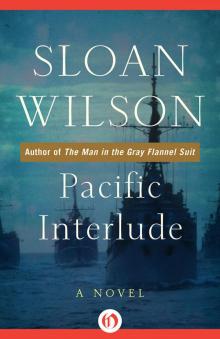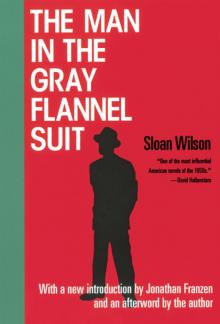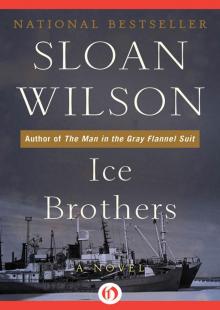- Home
- Sloan Wilson
A Summer Place Page 16
A Summer Place Read online
Page 16
“With this wind and tide we’ll drift fast,” he said. “Are you tired?”
“I can hang on.”
“Look at that channel marker,” he said. “You can see we’re moving by it.”
He crawled closer to her and put his arm around her thin shoulders to help her hang on.
“When it gets dark, they’ll come looking for us,” he said.
For about an hour they clung there, their bodies warm in the water, but their arms and shoulders chilled in the wind. “Are there alligators here?” she asked.
“They don’t bite people. Only crocodiles do, and they’re different.”
“Sharks?”
“They don’t come up rivers like this.”
Finally they saw that they were drifting down on one of the sand spits cast up by the dredge. Suddenly his feet touched soft mud, barely thicker than the water.
“Maybe we can pull the boat up here and bail it out,” he said.
“Let’s swim in and rest first.”
“No, wait till we drift in. It’s still farther than it looks, and we couldn’t walk in this stuff.”
“Will there be alligators?” she asked. “They don’t bite people,” he said.
Quietly they waited until the boat came to rest in the soft gray mud. Half swimming and half crawling, they made their way to the sand spit, pulling themselves out on their stomachs as though they themselves were alligators. The place smelled of seaweed and sewage. Above the waterline the sand was firm, and they stood up, shivering in the wind, but delighted to be on their feet. The sand spit was about thirty feet wide, a hundred feet long, and only about two feet above the water in the center. The gray sand was covered with broken white shells.
“I’m freezing,” Molly said.
“We could haul the boat up to break the wind, and maybe we could make a tent from the sail.”
Caught on the bottom and flooded with water, the boat would not budge, and John realized that it would be impossible to move her even if he could get footing in the mud. Quickly they removed the sails and spars and contrived a rough tent in the very center of the island. Splashing back and forth from the boat, even their heads became covered with mud, but they found their water bottle and a can of corned beef hash.
“I wish we could build a fire,” she said.
“Me too.” But of course everything was wet, matches included. Huddled in the shelter of their improvised tent, they ate and drank. By that time the sun was setting, and it was very cold. Molly’s teeth were chattering. Only the surface of the sand was warm.
“Maybe if we dug a hollow it would be better,” John said.
Immediately they set to work, scooping up the broken shells with their hands. Beneath the surface, the sand still retained the warmth of the sun. John cut his hand on a sharp shell, and sucked the blood.
“Let’s get the paddle and dig with that,” Molly said.
Emerging from the tent, they saw that the tide was receding, leaving the boat stuck in the mud. The paddle was nowhere in sight, but a loose floor board had drifted in, and they dug with that. In a few minutes they made a long hollow like a shallow grave. Wrapping themselves in the jib, which had partly dried, they lay down together and covered themselves with warm sand. The delivery from the cold was delicious.
“I’m sorry I turned the boat over,” he said. “It was my fault.”
“It’s all right,” she said, snuggling her thin, mud-soaked body against him drowsily. “They’ll be along to pick us up soon.”
“Still cold?” he asked.
“No.”
In the last glimmer of daylight a variety of long-legged birds could be seen stalking the mud flats around them. The tide continued to go out, expanding their island to the very edge of the channel. John hadn’t realized the tide went out so far. I wonder how high it will get when it comes in, he thought. The idea struck him that perhaps their tiny island would be awash at high tide; perhaps it had been only half tide when they arrived. But no, he thought; the sand would not be so firm if it had not been lying all day in the sun. Maybe, he thought. Why doesn’t anything grow on this place? How deep could the water get here at high tide?
We could cling to the boat again, he thought. Help will be here before long. They’ll miss us and go searching. Glancing down, he saw that Molly had gone to sleep, with her cheek resting peacefully against his shoulder.
On the distant shore that night the lights of cars could be seen bobbing along a road. Far down the river the red and green lights of a bridge glimmered. There was no sound but the lapping of the waves and the occasional screech of a bird. With Molly against him in their gravelike place, it was warm. He put his head down and went to sleep.
At about midnight the Coast Guard found them there. They were so exhausted that they did not awake when the searchlight swept by their tent. The first thing they knew, a sailor in rubber boots shook them and said, “Get up! Are you all right? Good God, you kids sure need a bath!”
Sylvia, Helen and Margaret were aboard the Coast Guard picket boat. Sylvia smiled with relief when she saw them, but Helen and Margaret were furious. Margaret grabbed Molly’s shoulder the moment the sailor set her down on the deck and said, “What do you mean, staying out so late? What have you been doing?”
“We capsized,” Molly said.
“You don’t have to tell me why he took her out here,” Margaret said, glaring at Sylvia. “Like mother, like son.”
“Stop it,” Sylvia said, aghast. “Don’t talk like that to the children!”
Molly and John stared at each other dully, too exhausted to think, but not to record what they heard to be dimly remembered later.
The next day Molly did not show up in front of her house at her usual time. Instead, old Bruce appeared. His skin had not tanned even during hours of polishing his car in the Florida sun, and he had a nervous habit of scratching himself on the seat of the pants. “Come here,” he said to John, in an attempt to sound friendly.
“What do you want?” John asked, immediately suspicious.
“I want to talk to you.”
Diffidently John went to him. “About yesterday,” Bruce said.
“What about it?”
“You can tell me,” Bruce said. “We men can talk about things like that.” He grimaced.
“About what?”
“What did you do, you two out on the island? You’re old enough.”
John said nothing.
“Her mother has to know,” Bruce said.
John ran, and Bruce started after him, but the lithe boy outdistanced him with no difficulty. John returned to the motel, and with sobs bottled in his throat, burst in the front door of his mother’s apartment surprising a colored woman on her knees scrubbing the tiles. “What’s the matter, honey?” she asked.
“Nothing!” John said. Rushing to his room, he threw himself on his bed and sobbed as though to mourn the end of all innocence.
Chapter Fifteen
THE NEXT DAY Molly showed up on the beach in front of her house at dusk. She looked almost as she always did that year, a slender girl, quick to smile and quick to frown, but now her fists were clenched, and on her face was the deathlike look of shock.
“Hello,” she said to John when he ran to meet her.
“Are you all right?” he asked.
“Yes,” she said and sat down on the sand. He sank down beside her, and the ocean looked black beyond the white line of the crashing breakers which still gleamed in the last rays of the sun. “She won’t let me see you any more,” Molly said.
“Why not?”
Molly shrugged, a quick emphatic gesture that was to become characteristic, but she said nothing. “I’ll see you anyway,” he said.
Molly was staring down with her face turned from him. “Mother says that my father and your…”
“What?”
“Mother,” she said. “A doctor… I can’t…”
There w
as a moment of silence during which they sat stricken by the terrible helplessness of childhood. A kind of shudder went through Molly’s body. At length, without saying anything, she shrugged again. Darkness fell and a dim half moon appeared, veiled behind streaks of dark clouds. It was about a half hour afterward that they heard, faint in the wind, the voice of someone calling.
“What’s that?” he asked.
“Her,” she said. They sat still while the word in the wind grew louder, clearly resolving itself into “Molly,” Helen’s voice full of anxiety and anger. John glanced at Molly and in the dim light from the moon saw she was smiling. “I’ve got to go,” she said. “Tell her you haven’t seen me.” Before John could answer, Molly was on her feet, running down the beach away from the voice and her home. John got up to follow her, but she seemed to dissolve into the night, and after a few minutes he stopped and turned around. Way down the beach he saw a flashlight bobbing, and the voice borne on the wind was clear. “Molly, Molly!” Helen was calling. John walked toward Helen slowly, his arms limp at his sides, his body bent forward, stalking, unconsciously stalking, not running, for the first time in his life.
“Molly, Molly!” Helen kept calling.
When John was about fifty feet from her, she saw him outlined against the sky, a tall fifteen-year-old boy, broad-shouldered, thick of chest, and already muscular of arm, a shadow in the night.
“Who’s that?” Helen called.
He said nothing.
“Molly, is that you?”
John walked toward her quietly, his feet making no noise on the sand. Helen shone the flashlight in his face. “Ah,” she said, “it’s you! I should have known!”
“Now you, Mrs. Jorgenson!” he said, his boy’s voice suddenly shrill in the night, high but commanding, a trumpet note.
“What?” A gasp of astonishment.
“Don’t you hurt her!” he said. “Don’t you hurt her! If you hurt her, I’ll kill you!”
“You’re mad,” she said, turning and running. “A crazy boy from a crazy family!”
He stood, his arms still slack at his sides, looking after her, watching the flashlight go bobbing erratically down the beach. Then he turned and walked back to the motel.
“Sit down for supper, Johnny,” Sylvia said when he got there. “You’re late.”
He sat down in the corner of the dining room of the small apartment and took a spoonful of heavy bean soup. He had half finished it when the young Negro who served as an attendant at the motel came and said something to Sylvia in a low voice. “Tell her I’ll call her back,” Sylvia said.
“But she said it was urgent, ma’am.”
“All right.” Sylvia left the table.
A moment later she came back, looking distraught, moving the fingers of both hands convulsively. “Son, come to my room,” she said.
John followed his mother across the small living room. As they climbed the stairs to her bedroom, he ran his hand along the railing, trying to think only of the way the cool wrought iron felt against his fingers. They went to her bedroom, and Sylvia shut the door. “Son,” she said, “Mrs. Jorgenson said you threatened her on the beach. Is it true?”
“I told her not to hurt Molly.”
“Where is Molly?”
“I don’t know.”
“Mrs. Jorgenson says she’s missing. Son, this is very serious. Mrs. Jorgenson has called the police.”
The police station in Palm River was a small stucco building, pale yellow in color, with different lavatories for the white and the colored people, but one jail cell for both. It smelled of a drunk who had been sick there the night before, disinfectant, whisky and stale cigar smoke. In a back room there was a desk, an unmade cot and a calendar with a picture of a naked girl coyly holding a small spaniel against her abnormally inflated breasts. “Lucky Dog,” the caption said.
“Now look,” said the chief of police, a mild-appearing little man dressed like a hardware clerk. “This is a serious situation. A girl is missing. She has been absent from her home for more than five hours. And a boy threatened a grown woman on the beach at night. We have to put two and two together.”
“You want to watch it, chief,” a lean lawyer with a brown vest said in a low voice at his ear. “You’re dealing with minors, and prominent families at that.”
“I ain’t said nothing except the facts,” the chief said.
John stood erect with his back against the wall. Beside him Sylvia sat on the cot, her head in her hands. Helen stood in the center of the room. “There was murder in his eyes,” she said. Margaret and Bruce, sitting at the side of the room, nodded as though they had been there.
“Now let’s play this thing over again,” the chief said in very reasonable tones. “Mrs. Jorgenson, did you do anything to upset the girl recently?”
“Not a thing,” she said. “I just had the doctor give her a physical examination to see if anything happened out on that island. I had to make sure. You can see that.”
“And the doctor’s report?”
“She was all right,” Helen said. Margaret and Bruce nodded again.
“But she seemed upset?”
“Yes, she seemed very upset. She’s always been a difficult child.”
“And you confined her to her room?”
“Yes.”
“But she wasn’t there when you went to bring her her lunch.”
“No.”
“You thought she was hiding in the house to be spiteful, but couldn’t find her, and finally went looking on the beach.” “That is correct,” Helen said in her flat Buffalo accent.
“And you met the boy and he threatened to kill you.”
“He did,” Helen said.
“And you don’t deny this, do you?” the chief asked, spinning to face John as he had seen detectives in television dramas do.
“No.” John’s voice was low. He knew better than to try to explain things to adults.
“When did you last see the girl?”
“Yesterday,” John said. “Last night, when we got back from the boat.”
“I think you’re lying,” the chief said. “I think you met her on the beach, and I think you…”
“Take it easy, Bob,” the lawyer whispered.
The chief sat back in his chair and lit a cigar. “Nothing to do but wait, I guess,” he said. “We’ll search the beach and dunes. We’ll drag the river. We’ve already notified the highway patrol. We usually don’t act so fast, but I don’t like the look of this case.”
“Let the boy go home,” the lawyer said. “Suggest that he stay in his room.”
“Will you keep the boy in his room?” the chief asked Sylvia.
“My son is innocent!” Sylvia replied. She didn’t lift her head.
“Will you be responsible for him?”
“Of course!”
That night John stood at the window of his room staring out at the beach and the dunes, where lanterns were circling, tracing out the search. His mother tried to comfort him, but he said he didn’t want to talk to her; he was all right, he maintained stiffly as he had since he arrived in Florida, and needed no help. The surf pounded and the palm trees rustled in the wind. The clouds made a kind of island reaching up for the moon, and three stars could be seen from the window. By four in the morning, most of the clouds had changed from gray to white, and it really wasn’t a bad sort of night.
The next day Molly was found wandering in a daze along the highway three miles north of town. For a week she was in the hospital recovering from exhaustion, and then she was confined to her bed.
When Ken got home and learned what had happened, he struck Helen for the first time in his life. Helen screamed, and Margaret and Bruce came running. In the heat of anger Margaret said they knew about Sylvia, and Helen shrieked that she wanted a divorce. She could have it any time, Ken said, but he wanted Molly. A fine father he’d make, Margaret replied. Aside from the question of his morality, hadn
’t his judgment about the boat trip been proved wrong? They’d all been against it from the beginning, but Ken had got his way, and now look what had happened.
“We have you cold,” Margaret said, lying, but sometimes, as she told Helen, a lie is effective. “We have witnesses.”
The argument lasted all night, and most of the next day, and the Carters had many hurried telephone conversations with lawyers. The upshot of it all was a suit for divorce. It was agreed that during the proceedings it would be best to send Molly to boarding school.
Ken spent a lot of time talking to his daughter, but she was withdrawn and wouldn’t speak to him at all. After Helen got through telling her about Sylvia, she wouldn’t even look at him.
Briarwood Manor in Virginia, a school which Miss Summerfield, its headmistress, said was the best in the United States, was selected. The Carters escorted Molly to the train and seemed enraged to find Ken there with a large, elaborately wrapped box under his arm. John also came to see Molly off. It was a strained group which assembled around her. Ken gave her the box and told her to open it after the train started.
“Thanks,” Molly said meekly, and allowed herself to be hugged.
John had nothing to give her—only a look of naked, despairing love that made the Carters say it was lucky she was leaving. Molly shook hands with him and said she hoped she’d see him again, but there was an almost deathlike passivity in her voice. She didn’t look as though she cared much about seeing anybody again. Before the porter called “All aboard” she turned from her family and insisted on going alone to the compartment Ken had reserved for her. She sat there with the large box on her lap, staring out the window. It was an hour before she unwrapped her gift and found it to be a glossy mink coat, real mink. Bending double, she buried her face in the soft fur, and it was only then that she cried.
Chapter Sixteen
THERE WAS SO MUCH TALK about the divorce that Sylvia decided it would be better to send John off to boarding school too as soon as possible, but it took several days to make the arrangements with Colchester Academy, which had been decided upon. Meanwhile, she told him, he didn’t have to go to the local school—he could have a real vacation. Most of it he spent wandering around the Municipal Docks.

 A Summer Place
A Summer Place Pacific Interlude
Pacific Interlude Man in the Gray Flannel Suit
Man in the Gray Flannel Suit Ice Brothers
Ice Brothers